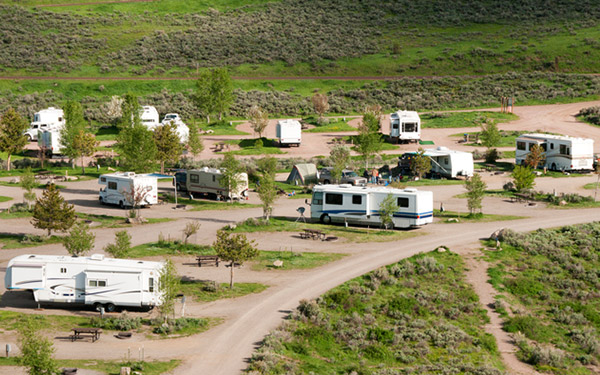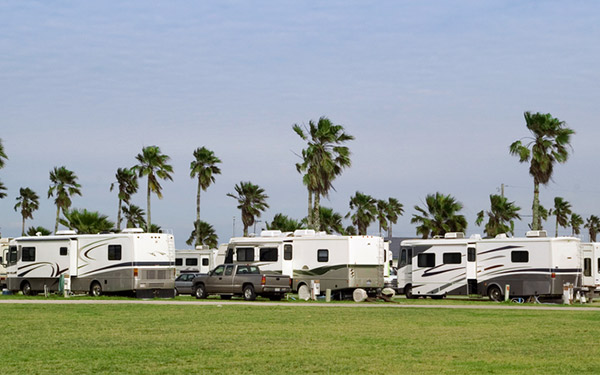Some 1.3 million Americans are full-time RVers. One RVing couple has their own radio show called LivingTheRVDream.com in which they offer tips and stories from their own RV experiences. Some people live in an RV to save money while others are living the RV dream of having the freedom to travel. Without the proper planning and discipline, however, you’re not guaranteed to have an easier time of it financially. Saving money living in an RV full-time requires discipline and some self-sacrifice. But anyone can do it, and at any age.
Rent

Most camp sites charge around $50-$70 per night. There are free or low-cost campsites too, but generally speaking, you have more inexpensive options west of the Mississippi River. You also have the option of becoming a member of Passport America RV Club. For a $45-a-year membership you can get some nice perks, like rent for as little as $12 a night.
The cost of rent will ultimately depend on how and where you want to live. If you decide to stay very close to civilization and near a major highway, you’re paying anywhere between $1,400 and $1,600 a month in rent. But, if you stay in a state park, your rent drops significantly to about $600 a month with all utilities included except propane. Keep in mind that you’ll have to visit the dumping station every few days and you may have not neighbors close to you (for good or bad). You will pay about $500 a month rent staying in one of the national parks that offer camping. Here, you will most likely have no hookups whatsoever and you’ll be roughing it. You will, however, save lots of money.
You’ll also have to consider where you choose to declare as your RV home base. South Dakota is probably one of the most popular states for RV-ers because there’s no state income tax and you won’t be paying property tax if you’re living out of your RV. There are other factors that go into choosing which state you’ll call home (and where you’ll collect mail), so think things through, and not just about saving on taxes.
Working While on the Road

You don’t have to be a retiree to get off the hamster wheel of life and become a full-time RVer. Many people work as freelancers and consultants while on the road. Others choose to work at the parks, either in reservations or maintenance. If you get a job at the park, you’ll most likely be granted a free parking spot and a small stipend that should take care of your bills. If you’re RVing with your partner, you can get some great well-paying jobs through an organization that matches couples to employers. Don’t mind doing chores like house sitting or working on the ranch? Check out these two popular organizations that hire couples: Working Couples and Caretaker Gazette. If you’re working and living in an RV, yes, you can definitely save some money!
Bills
You will still have rig payments, which can be reasonable or as expensive as buying a house, depending on the RV you’re buying. You’ll also have electricity bills, which could give you sticker shock if you’re not careful. At most camp sites your electricity bill is included, but if you stay at one site for more than a few weeks, you’ll be responsible for paying for your own electricity. Even if you are responsible for your own electricity, it should rarely cost more than $100 a month because you’re probably not living in a space that’s much more than 300 or 400 square feet.
If you add on some (pricey) modifications to your RV, such as adding solar panels, you will save money on electricity bills in the long-run.
Food

What will create a hole in your pocket is eating out. You may not be used to cooking in such a tight space or you may just feel like abandoning your usual routine, but eating at restaurants regularly adds up very quickly.
Gas
Most people assume gas is the biggest expense for RVers, but unless you’re driving hundreds of miles each day, that may not be the case. Of course, spiking gas prices can hamper your goals of RVing full time but it’s easy enough to adjust by driving less and staying at one site longer. If you’re towing a lightweight car to explore your surroundings you’ll be much better off than driving around your heavy gas-hungry RV. The best bet is to drive less and tow a lightweight compact car if gas prices suddenly soar.
Your RV
Unless you’ve saved for this day, you will most likely have to put a down-payment on your rig and pay it off monthly, just as you would a car or house. Compared with the price of buying a home, an RV may be less expensive, but it’s certainly not cheap, especially if you’re buying a brand new vehicle.
For a used motor home, you will be paying around $80,000-$100,000 easily. If you’re buying a fifth-wheel that is towed by a truck, you’re spending around $50,000 for the rig and there’s always the price of the truck, which can easily cost up to $40,000.
Getting a loan on one of these vehicles is not easy either, unless you’ve still held onto your job. If you go over budget with the rig you choose, you will not be saving much money at all. So, if you’re serious about saving money while on the road, buy a less expensive RV, drive less, stay in a cheaper campsite and try to work, even if it’s part time.
The information in this article was obtained from various sources. This content is offered for educational purposes only and does not represent contractual agreements, nor is it intended to replace manuals or instructions provided by the manufacturer or the advice of a qualified professional. The definitions, terms and coverage in a given policy may be different than those suggested here and such policy will be governed by the language contained therein. No warranty or appropriateness for a specific purpose is expressed or implied.
